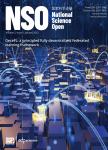Artificial intelligence for the understanding of electrolyte chemistry and electrode interface in lithium battery
作者机构:Hefei National Laboratory for Physical Science at MicroscaleCAS Key Laboratory of Materials for Energy ConversionDepartment of Materials Science and EngineeringUniversity of Science and Technology of ChinaHefei 230026China Institute of Functional Nano&Soft Materials(FUNSOM)Jiangsu Key Laboratory for Carbon-Based Functional Materials&DevicesJoint International Research Laboratory of Carbon-Based Functional Materials and DevicesSoochow UniversitySuzhou 215123China Jiangsu Key Laboratory of Advanced Negative Carbon TechnologiesSoochow UniversitySuzhou 215123China
出 版 物:《National Science Open》 (国家科学进展(英文))
年 卷 期:2024年第3卷第2期
页 面:74-97页
学科分类:12[管理学] 1201[管理学-管理科学与工程(可授管理学、工学学位)] 0808[工学-电气工程] 081104[工学-模式识别与智能系统] 08[工学] 0835[工学-软件工程] 0811[工学-控制科学与工程] 0812[工学-计算机科学与技术(可授工学、理学学位)]
基 金:supported by the National Key Research and Development Program of China(2022YFA1504102) the Strategic Priority Research Program of the Chinese Academy of Sciences(XDB0450302) the National Natural Science Foundation of China(52225105,22279127,52072358 and U21A2082) support from Suzhou Key Laboratory of Functional Nano&Soft Materials the Collaborative Innovation Center of Suzhou Nano Science&Technology the Priority Academic Program Development of Jiangsu Higher Education Institutions(PAPD) the Joint International Research Laboratory of Carbon-Based Functional Materials and Devices(the 111 Project) the National Natural Science Foundation of China(22173066) the National Key Research and Development Program of China(2022YFB2502200)
主 题:lithium batteries battery interfaces artificial intelligence machine learning electrolyte chemistry
摘 要:Recognizing the critical role of electrolyte chemistry and electrode interfaces in the performance and safety of lithium batteries,along with the urgent need for more sophisticated methods of analysis,this comprehensive review underscores the promise of machine learning(ML)models in this research *** explores the application of these innovative methods to studying battery interfaces,particularly focusing on lithium metal *** the limitations of traditional experimental techniques,the review supports a hybrid approach that couples experimental and simulation methods,enabling granular insights into the formation process and characteristics of battery interfaces at the molecular level and harnessing AI to extract patterns from voluminous data *** showcases the utility of such techniques in electrolyte design and battery life prediction and introduces a novel perspective on battery interface *** review concludes by asserting the potential of artificial intelligence(AI)or ML models as invaluable tools in the future of battery research and highlights the importance of fostering confidence in these technologies within the scientific community.



